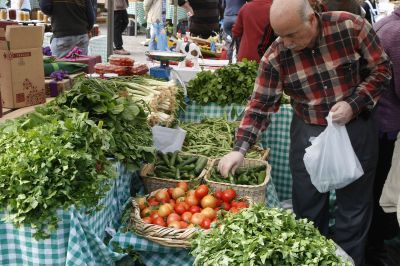'What's in my tabbouleh?', Lebanese ask

Your support helps us to tell the story
From reproductive rights to climate change to Big Tech, The Independent is on the ground when the story is developing. Whether it's investigating the financials of Elon Musk's pro-Trump PAC or producing our latest documentary, 'The A Word', which shines a light on the American women fighting for reproductive rights, we know how important it is to parse out the facts from the messaging.
At such a critical moment in US history, we need reporters on the ground. Your donation allows us to keep sending journalists to speak to both sides of the story.
The Independent is trusted by Americans across the entire political spectrum. And unlike many other quality news outlets, we choose not to lock Americans out of our reporting and analysis with paywalls. We believe quality journalism should be available to everyone, paid for by those who can afford it.
Your support makes all the difference.A series of food scandals has prompted the Lebanese, who pride themselves on the quality of their cuisine, to look more closely at what goes on their plates and to increasingly turn to organic produce.
The food scare was sparked by reports of high levels of pesticides detected in locally grown fruit and vegetables, including grapes, strawberries, potatoes and apples, some of which contained 25 times internationally accepted levels.
"We don't dare buy anything anymore," said Liliane Baz, a resident of Beirut. "They said courgettes, cucumbers, strawberries, lettuce, tomatoes, basically all fruits and vegetables, are poisonous."
"What's left to eat?" she asked. "I now trust vegetables coming from Syria or Jordan more than homegrown produce."
Salem Hayyar, who authored a recent pesticides report that contributed to the scare, said that while the media blew the findings of his research out of proportion, Lebanon's sunny, fertile fields are awash with toxins.
"There is definitely a problem with pesticides in Lebanon," said Hayyar, a professor at the state-run Lebanese University. "But the answer is not organic. It's teaching farmers how to use the right pesticides at the right time."
Experts blame lack of government action and proper legislation for having given farmers a free hand in the use of pesticides, which sometimes are not labelled and are mixed locally.
"There are no food safety laws in Lebanon, so there is no way to verify how or when pesticides are being used and when the produce is harvested," said Zuhair Berro, president of Consumers Lebanon, a non-governmental organisation.
"What we do know for sure is that farmers are not respecting the time they should wait before harvesting, and there is no one to hold them to that or even open their eyes to the wrongdoing."
Berro said that the problem is such that some produce exported in recent years to Europe was returned, the most recent being a shipment of grapes.
While acknowledging a lack of funding and manpower to properly address the problem, the agriculture ministry has cautioned against generalisations saying that not all farmers were using pesticides improperly.
The food scare has nonetheless come at an opportune time for the budding local organic market, which is struggling to keep up with demand.
"People have really gone hysterical - our clientele has doubled since the pesticides scare," said Kamal Mouzawak, the founder of Souk el Tayeb, Lebanon's first farmers' market launched in 2004.
"Before we used to sell out by closing time at 2:00 pm, but now people line up before opening time to get first dibs."
Organic fruit and vegetables are not accessible to all, however, as they typically cost twice as much as non-organic produce.
"Organic produce is more expensive, so naturally it was initially popular with a fortunate few," said Rafiq Bustany, who grows organic fruit and vegetables sold at the farmers' market.
"But today even the middle class is gaining interest, and we are not able to keep up with the new demand."
Organic-only grocery stores and organic corners in major supermarkets are also sprouting across Lebanon's capital, and one grocery store even delivers a "healthy basket" to clients' doorsteps.
A handful of restaurants are also offering organic menus and now catering to a wider audience.
Mouzawak, who recently opened a restaurant that serves organic food, said he hoped the new interest in organic food was not simply a fad but would lead to real change in how people eat.
"Unfortunately I think it is a temporary craze, like so many other crazes, so we can only hope this hysterical reaction will turn into permanent action," he said.
Rula Najjar says she is one of those who have made the full-fledged transition to healthier eating.
"I have a new rule," said the 25-year-old as she went through her shopping list at an organic food store in Beirut's Ashrafieh district.
"If it's not something my great-great grandmother ate, I'm not eating it either."
Join our commenting forum
Join thought-provoking conversations, follow other Independent readers and see their replies
Comments